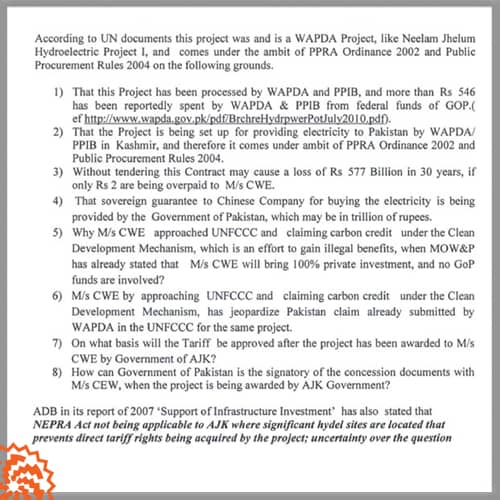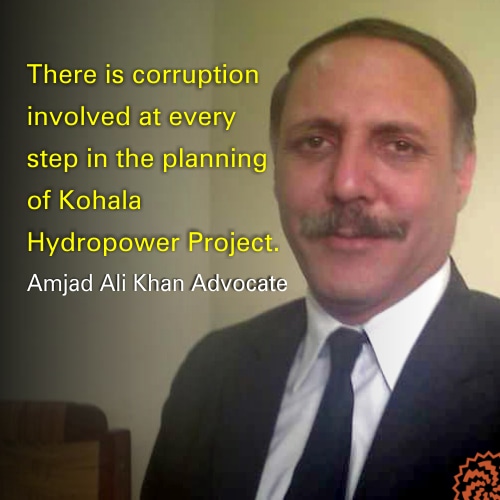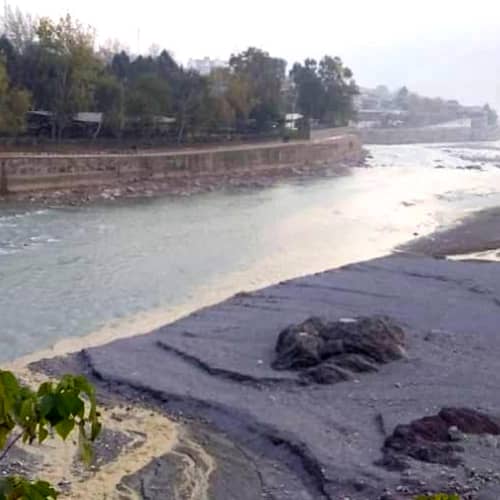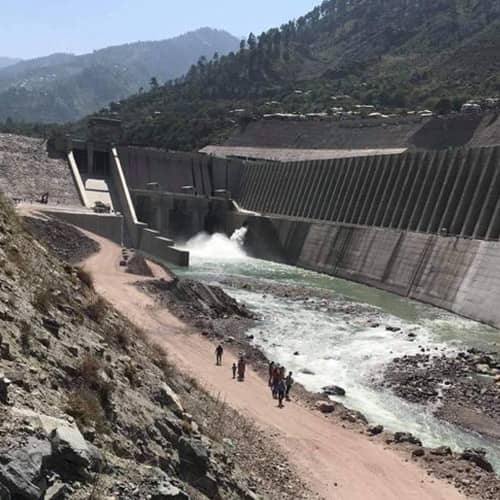For the past three years, Amjad Ali Khan has been pursuing several petitions against the Kohala and Neelum Jhelum hydropower power projects before the Azad Jammu Kashmir courts.
Paperwork for the Kohala project has been in progress since 2011 while the project’s foundation stone was laid in 2015. The project envisages setting up a run of the river hydel power station with installed capacity of 1124 megawatts on River Jhelum at Kohala near Muzaffarabad.
Though the construction work on the project has yet to start, many locals are airing their misgivings about the utility of the project. Some of them have taken the project’s financial, social and environmental aspects to Azad Jammu and Kashmir's top judiciary and Khan is representing them before the courts.
He is a Muzaffarabad based lawyer and has been appearing before courts for the past three decades. In addition to this, Khan has also worked for the National Accountability Bureau as its counsel. “Massive irregularities have been committed in the planning of the Kohala hydropower project and such mega projects are a source of minting money for the bureaucracy and lawmakers,” he said.
Anti-corruption watchdog, Transparency International has also written several letters to the federal government pointing out corruption in the project, which also led credence to Khan’s assertions.
A Transparency International letter dated September 5th 2011, and addressed to the Economic Coordination Committee (ECC) of the cabinet noted that the Kohala's project 2.2 billion dollars contract was awarded to a private Chinese company China International Water and Electric Company without inviting public tenders. It said that the award of a contract without holding bidding was a glaring violation of both the Public Procurement Regulatory Authority Ordinance 2002 and Public Procurement Rules 2004.
This ordinance and rules required the federal government to invite public tenders for any project and empower the relevant authority issuing the bids to accept or reject any or all offers after comparing them. Transparency International also pointed out that due to the award of the contract without tendering Pakistan will have to pay the Chinese company two paisa per unit surcharge which will lead to 557 million rupees in financial losses over a period of 30 years.

The federal government officials, however, distance themselves from the project and said that the center has nothing to do with the Kohala hydropower project. They claimed that Kohala was a project of the Azad Jammu and Kashmir's government, which has entered into an agreement with the Chinese company for its construction; therefore, the federal public procurement does not apply on the project.
In light of many other facts, the ECC claims that the center has nothing to do with this project and does not appear to hold much water.
First, the project was a part of the China Pakistan Economic Corridor (CPEC), which in itself was a result of high level agreement between both countries. One of the most important aspects of the CPEC was the foreign exchange required for the execution of the many projects conceived under this project for which the Chinese public and private financial institutions will provide loans to Pakistan. The Pakistani government has provided sovereign guarantees for these loans to repay the debt in case the borrower fails to pay it. The federal government has provided the sovereign guarantee for the Kohala hydropower project.
Secondly, Pakistan has also registered the Kohala project, executed by the Water and Power Development Authority (Wapda) with the United Nations Framework Convention on Climate Change (UNFCCC). On the basis of this registration, the Pakistani government has claimed before the United Nations that Kohala was an environmentally friendly project and will help reduce carbon emissions; therefore, it should receive the financial benefits of the carbon credit under the UNFCCC. The submission also says that the federal government shall receive these benefits as it was building the project.
Besides, Transparency International is of the view that due to the listing of the project for carbon credit, Wapda footed the bill for the project's design. Wapda had paid 557 million rupees to a consortium of SMEC Australia, Scott Wilson UK, Sogreah Consultant France and MES and EGC Pakistan for the project’s feasibility study.
Transparency International also questioned why the federal government signed the project agreement with the Chinese company, if it was an Azad Jammu and Kashmir government project. On these grounds, Transparency International has repeatedly pointed out that the Wapda and another government entity Private Power and Infrastructure Board were building the Kohala project; therefore, the federal government should ensure implementation of public procurement laws and rules.
However, some government functionaries instead of directly responding to these allegations, point fingers toward the Transparency International Pakistan chief Syed Adeel Gillani's closeness to the Pakistan Muslim League (PMLN) leadership.

These officials claimed that Gillani's organization always zealously highlights alleged corruption of other governments; however, keeps mums in the PMLN rule. “PMLN had in its last tenure appointed Gillani a member of the Prime Minister Inspection Team and later as Pakistan Ambassador to Serbia,” an official said.
Procedural irregularities in the project
Syed Ghazanfar, a lawyer associated with the Lahore based Collective Alternative Law (ALC), has followed the subject of environmental pollution resulting from electricity projects.
Ghazanfar has petitioned the courts against several projects and currently some of the projects are pending in courts.
He said that section 2 of the Public Procurement Regulatory Authority Ordinance 2002 has defined public procurement as “acquisition of goods, services or construction of any works financed wholly or partly out of the public fund.” Ghazanfar said that this ordinance must be followed in the construction of the Kohala hydropower project as Wapda, a government entity has borne all expenses of project design.
“A Chinese company has been allowed to produce electricity from water, a local asset, and the electricity produced from this asset will also result in financial benefit,” he said.
He said that a public asset and benefit accruing from it also came under the definition of public procurement contained in the section 2 of the Public Procurement Ordinance 2002.
In addition to this, Ghazanfar said that only the Public Procurement Regulatory Authority can give an exemption from Public Procurement Rules.
However, the exemption should be given only when it is inevitable to protect the national interest.
Besides, he explained that the ECC never recommended exempting the project from procurement rules and or it was not possible to protect national interest without giving an exemption to this project.
Khan also said that the Supreme Court in its verdict on rental power plants on March 30th, 2012, had declared that the government should offer sovereign guarantees to projects resulting from shady agreements or contracts without open bidding.
Also Read

Death of a river foretold: How faulty planning has brought about Neelum River's doom
He said that offering sovereign guarantees for projects like Kohala was in clear violation of the apex court orders and as well as the National Accountability Bureau's 1999 rules.
Referring to Transparency International's letter dated October 3rd, 2012, and addressed to Principal Secretary to Prime Minister Ayub Qazi, he said that Minister for Finance Abdul Hafeez Sheikh was informed time and again that the award of Kohala hydropower contract was in violation of the federal laws and regulations.
Khan regretted that no action had been taken against any government official from Wapda, Private Power and Infrastructure Board (PPIB), and other federal departments. “On the other hand, the government was not even ready to acknowledge any wrongdoing in the project at all,” he added.
Published on 17 Dec 2021



















